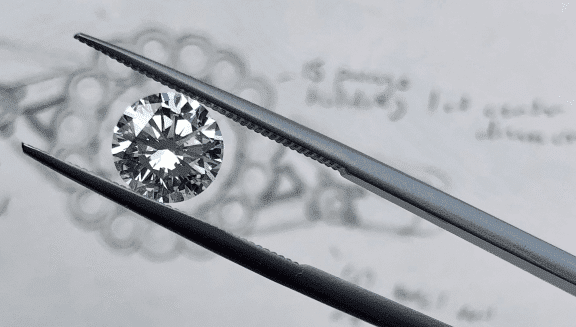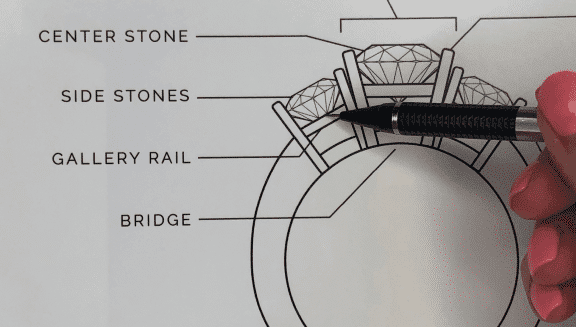Everything You Need to Know About Creating an Engagement Ring with Lab-Grown Moissanite
“Many women would love the opportunity to wear a rare gem from the heavens that is hand polished, environmentally friendly, and available at an incredible price.” – Randy McCullough, Charles & Colvard President and CEO
A great alternative to diamonds, lab-grown moissanite is quickly becoming a popular choice for more budget-friendly and earth-friendly engagement rings. At Abby Sparks Jewelry, we love when our client gets exactly the engagement ring they want but it’s even better when it comes with none of the financial or unethical baggage! If you are searching for a diamond alternative engagement ring using a clear or white gemstone that is dazzling, budget-friendly, durable, and created using ethical, sustainable production practices, then lab-grown moissanite is your best bet.
(Platinum custom engagement ring featuring a 1.42 carat lab-grown moissanite, made exclusively by Abby Sparks Jewelry)
What is Moissanite?
500,000 years ago, a meteorite struck Earth in the region we now know as Arizona. Thousands of years later, in 1893, Dr. Henri Moissan was studying its crater, and unearthed microscopic particles of brilliant, shiny matter. At the time, the Nobel Prize-winning chemist thought he’d uncovered a small deposit of diamonds. However, he soon discovered that the mysterious matter was even more rare! Moissanite is identified as silicon carbide and named in Dr. Henri Moissan’s honor. Since then, moissanite has only been discovered in meteorites and at the tops of volcanoes. Due to the scarcity of natural moissanite, you’re unlikely to find a natural moissanite with a reasonable price tag on the market for your engagement ring, but lucky for us Moissan dedicated the rest of his life trying to recreate silicon carbide in a laboratory so that we could make dazzling engagement rings using gemstones from the stars!
How is Lab-Grown Moissanite Created?
In the late 90’s lab-grown moissanite became a reality thanks to the Research Triangle in North Carolina. Using a thermal growing process, scientists were able to create silicon carbide crystals identical in structure to natural moissanite. It takes their labs two to three months to create a single gem of lab grown moissanite, due to an extremely complex and expensive process. The process is lengthy compared to other lab-grown gemstones, but we’ll take that over waiting for a meteor strike any day.
Due to its scarcity, almost all moissanite used in jewelry today is lab-grown. However, the brilliance and fire of lab-grown moissanite rivals that of natural moissanite. Trust us, our custom engagement rings like the Sara (shown above) give off quite a sparkle!
Moissanite vs. Diamond
Clear stones are popular in jewelry but especially so in engagement rings and wedding bands. It is common for lab-grown moissanites to be compared or confused with mined diamonds or lab-grown diamonds. On the surface, these dazzling stones are very similar. They both have a high refractive index, are very durable, have a high scale of hardness, and lots of brilliance and fire. The stones’ differences can be found upon closer inspection to their hardness, brilliance and chemical make-up. For an overview of each of these popular engagement ring stones, check out our blog Diamond, Lab-Grown Diamond, and Lab-Grown Moissanite: What’s the Difference?
(Sparkle video of a one carat round, lab-grown moissanite in the Abby Sparks Jewelry showroom)
Lab Grown Moissanite Characteristics
Brilliance
If you love sparkle, then consider using lab-grown moissanite in your engagement ring. Sparkle is measured by brilliance. Brilliance is relative to a stone’s refractive index, and this dazzling stone has a refractive index ranging from 2.65 to 2.69. For comparison, a diamond’s refractive index is only 2.42. Not only does lab-grown moissanite have a higher brilliance than most stones, but also it’s fire is dazzling. Light refracting off lab-grown moissanite creates a rainbow of colors and a fire that is higher than any other stone, at a dispersion of 0.104. Don’t believe us, check out the video above of the sparkle on one of our lab-grown moissanites!
Durability
Engagement rings can suffer from an active or accident prone lifestyle. Thankfully, for those that are constantly on the move, we at Abby Sparks Jewelry create engagement rings that complement your lifestyle. Lab-grown moissanite as an engagement ring choice is great since lab-grown moissanite is extremely durable. Due to the strength of the carbon bonds in silicon carbide, lab-grown moissanite is one of the hardest known substances and has a hardness score of 9.25 on the Mohs Scale of Hardness, exceeded only by diamonds. These tough gemstones are also highly resistant to heat, so rest assure that your engagement ring will be less likely to get damaged in a jewelry repair or a house fire.
Colors
Though lab-grown moissanite is considered a “colorless gemstone,” they are not completely without color. In certain lighting, a projection of colors can be seen. This is a fantastic characteristic that sets them apart from diamonds and we find that our clients love the rainbow of color their custom lab-grown moissanite engagement ring emits.
Inclusions
Like every jewelry-grade gemstone, lab-grown moissanite has inclusions. Though considered imperfections, these tiny inclusions are unique for each individual stone and therefore define the stone since the inclusions allow each stone to be one-of-a-kind. The inclusions in lab-grown moissanite are usually microscopic and do not affect the clarity or brilliance of the gemstone with regards to what the eye can see.
(14k yellow gold custom engagement ring featuring a 2 carat antique cut lab-grown moissanite made exclusively by Abby Sparks Jewelry)
Ethics and Sustainability
If you lose sleep over the social, political, and environmental effects of gemstone extraction, rest assured that your engagement ring is ethical, eco-friendly, and sustainable when you choose a lab-grown moissanite. Because these gemstones are created in a lab using silicon and carbon, lab-grown moissanite engagement rings like The Laura (shown above) LINK have no risk of unsustainable gem mining, exploitation of human labor, and indirectly supporting conflict.
Cost
Lab-grown moissanite costs significantly less than many other stones, diamonds included. Used popularly as an alternative to diamonds, lab-grown moissanite engagement rings at Abby Sparks Jewelry typically costs about 30-50% of the price than the cost of its diamond engagement ring counterpart, making it a more budget-friendly option for popping the question. Since we make one-of-a-kind, true custom engagement rings, the exact savings using a lab-grown moissanite center is not precise due to additional design, metal type, and accent stone options. Check out our Custom Engagement Ring page to see the pricing of some of lab-grown moissanite creations.
The popularity of lab-grown moissanite is skyrocketing as consumers are becoming more conscious of value and origin of the stones in their jewelry. Diamonds have been the most common stone for engagement rings and wedding jewelry for decades but this may very well change in the future. The jewelry industry, particularly with bridal, has seen a steady increase in lab-grown moissanite sales each year, convincing those in the industry that lab-grown moissanite is a smart investment for your engagement ring and also a market option that is here to stay. We love that this sparkling gemstone is getting more recognition and look forward to making more lab-grown moissanite engagement rings like the Caroline custom engagement ring below.

(Platinum custom engagement ring featuring a 1.53 carat lab-grown moissanite made exclusively by Abby Sparks Jewelry)
Why Choose Lab-Grown Moissanite?
If you’re searching for the perfect gemstone for your engagement ring, consider lab-grown moissanite. After all, this stone is eco-friendly and ethically sourced. If you’re on a tight budget, but want a clear stone like a diamond, lab-grown moissanite just might be the answer. If you want to have a very special, one-of-a-kind engagement ring then consider optimizing your budget on the custom designed, handmade aspect of the ring, i.e. the setting, and less on the center stone, thereby making lab-grown moissanite a great engagement ring option. And if you’re someone who likes brilliant sparkle and a rainbow of refracted color every time you step into the light, lab-grown moissanite will give you a killer engagement ring.
If you’re sold on lab-grown moissanite as your center stone option and you want a truly unique engagement ring, then reach out to us. If you want to understand the custom design process a little more, here is a little more about our custom process. Get started creating the perfect custom engagement ring using lab-grown moissanite by booking an appointment at our showroom in the Lower Highlands neighborhood of Denver, CO either online or by phone at 303.957.6502.








Comments